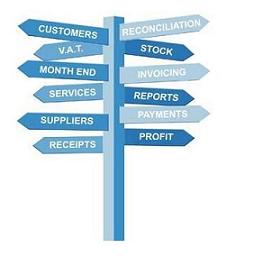 For every business or enterprise, financial accounting and bookkeeping are vital functions to measure its viability and to calculate the tax it will owe to the relevant government or authority.
For every business or enterprise, financial accounting and bookkeeping are vital functions to measure its viability and to calculate the tax it will owe to the relevant government or authority.
These days, most business people will use computer software to manage the books, and while some will to try and use generic spreadsheet software such as Excel to do so, most professionals will buy dedicated accounting packages that are specifically tailored for the purpose.
Accounting software is therefore a vital tool for running the modern business, and can also be a major outgoing if you are a large organisation with a sizeable finance department that requires multiple software licences.
So, given that accounting software is an important and potentially costly part of maintaining your company or organisation, by what criteria should you select the accounting software package that is right for your business?
Here are 14 questions that you should ask to help you identify good accounting software:
1) Can you try the software before committing to it or is there a free trial period available?
It is important that you are able to try out the software before you fully commit to purchase it.
Whether it be a day of demonstration and training from a Sales Rep or (preferably) a free trial period with the software, you must ensure that the software is to your liking and that you get on with it before you make that final purchase. Otherwise, you will be lumbered with a potentially costly outgoing that no-one in your organisation will benefit from, and you will soon have to start the whole purchasing process over again.
2) Does the free trial version have all the functionality of the final purchase version?
If you follow the advice above, does the trial or demo version that you have access to prior to final purchase have all the features and functionality of the final package?
If not, you may not be getting an accurate picture of what you will end up with. Also, can the trial version actually be used on a day-to-day basis as your accounting software? For example, will it store all the necessary customer contact details? And, if so, will they be retained once you decide to upgrade to the software package proper?
Always be hesitant in signing up for trial software that is not fully representative of the final package.
3) Is the accounting software easy to use and is it pertinent and tailored to your sector or business?
This question can be fully answered by undertaking a trial period with the software, and it is arguably one of the main key criteria that should influence your final purchasing decision.
In short, you must find the software easy to use and fit for your particular purpose. Can you intuitively do everything that you need to do on the software? If not, and the package is creating more work and stress than you had previously when maintaining your accounts, that software package may not be for you
In addition, all the information stored on the accounting software package should be readily retrievable in a digestible format. The better software packages now tend to present information via a main central dashboard that is easy to navigate and to manipulate to get the financial data you need at any one given time.
Also, you must honestly assess whether the software package is suitable for your business or sector. If you are a manufacturer of a complicated range of products, you may want to ensure that the software can allocate costs and supplier details for all the parts that you regularly order. You may also want to investigate the possibility of additional software plugins that can help you monitor stock levels and other details from the main dashboard.
4) Does it have too many features that you will never use?
At the other end of the spectrum, you may find that the accounting software package that you are trialling is full of features and functions that you will never use as part of your business.
This is not to belittle these features (I am sure they are very useful to particular people and industries), but if you are considering a high-end, sophisticated accounting software package for a relatively simple business, it is probably not the package for you.
5) Are you being charged too much for these features which you never use?
Not only are additional features that you will never use redundant in the truest sense, they will also probably cost you money.
The more complex the accounting software is, the more likely it is that it is going to be expensive.
Again, this is not to necessarily denigrate the programming or the package itself, but you could find yourself buying into very expensive piece of software that you will hardly make the most of. You would not buy a Formula One car as a vehicle in which you would do your weekly shop, and so it is with accounting software.
Only buy the accounting software that provides just what you require, and within a realistic budget that will reflect your true use of it.
6) Is the package aimed at the accountant or the client?
Obviously, the right answer to this question is dependent of whether you are a fully-fledged accountant or just bookkeeping on behalf of a business or organisation.
If you are an accountant, you will probably require a more sophisticated piece of software that will allow you to manage and maintain the accounts of your clients, whereas a bookkeeper might require a comparatively simple software interface with which to log the day to day expenditure and income of the business in question.
Therefore, two different sets of criteria apply for your purchase depending on who you are and what you intend to use the software for. A good choice of accounting software for an accountant could be a disastrous choice for a business owner who does his own bookkeeping.
However, whatever final package both parties settle on, it is important that both are compatible with each other, as we will explore below.
7) Is it to be locally installed on a hard drive or server?
If the software is to be stored locally on a business’ computer hard drive or server, a whole series of questions will have to be satisfied as to whether you are getting the right package.
How will the information on the accounting software package be backed up? Who will have access to the accounting software and does the host machine always have to be left on so multiple users can access the accounts? What security measures have you put in place to protect the information that is to be stored via the software, and will the software be upgraded over time to reflect changes to computers’ operating systems and hardware requirements?
We will be tackling these questions in more detail below and in future blog articles, but the decision to host the software on a computer hard drive or server on your own premises can be a costly one that would require additional logistics.
In my opinion, the better software packages are being hosted online via ‘cloud computing’, which I will explain further below.
8) Are you buying the right version of the software to share files with your accountant/ your client?
Each computer software product goes through several iterations or release updates over the course of its commercial life, as manufacturers fix bugs, improve functionality and adapt the software to changing computer hardware specifications.
Accounting software is no different, and it is important that you choose a version of the software that is not too old, as this can lead to compatibility issues with third parties going forward. In particular, if you share your accounts with an accountant (or if you are an accountant who wishes to share accounts with a client), you should determine whether the software owned by both parties is compatible with each other.
It is advisable that both client and accountant talk to each other prior to purchase of new accounting software to avoid such problems, but the client has to be mindful that it might be in the financial interest of the accountant to advocate one particular piece of software over another (see Point 12 below).
9) What is the ongoing support offered at the point of purchase? Is LVC (Latest Version Cover) included?
Because software evolves along the lines described above over its commercial life, it is vital that you determine whether upgrades to the software require any further financial cost to yourself.
It is the decision of the software manufacturer whether an upgrade is a modification to an existing version of software or, if the change is significant enough, is classed as a new product in its own right. In either scenario, the purchaser must see whether such upgrades are covered in the initial purchase cost, as otherwise you could find yourself paying for modifications and upgrades on an ongoing basis, adding to your outgoings.
To avoid the accusation of ‘hidden charges’, the better software manufacturers will make such arrangements explicit prior to purchase, with some offering LVC (‘Latest Version Cover’), which could form part of an ongoing service contract that will probably save the purchaser substantial amounts of money in the longer term.
10) Is the software ‘portable’ and can your accounts be exported?
In a similar vein to the question of whether software packages are compatible with each other, another important feature of any good accounting software package is whether you can export all the information stored on it into a format that can be uploaded by a completely different package.
This is important, as you want to retain the ability to change your accounting software package at a later date. Otherwise, you are a captive audience to that particular software package and are beholden to any changes to either the software or its price structure that might not be to your liking.
Virtually all good accounting software packages offer this feature, but it is an essential feature of any such purchase.
11) If you are an accountant, can the software be branded with your company’s details?
Some accounting software packages enable accountants to add their own branding to them, which is a subtle but effective marketing tool if the accountant is selling on the software or the service to their clients.
12) Are you being sold or pressurised into buying one particular accounting software package?
Some accountants are offered financial inducements by accounting software manufactures for referrals or for direct selling of theie products.
As it happens, the accounting software package in question might be appropriate for the client in question, but given the recommendation is being made due the accountant’s own financial self-interest, it is important that the client thoroughly goes through all the criteria listed in this article to ensure that the package being pushed is appropriate for their business and day-to-day use.
13) Is the software appropriate for your current computer’s operating system and hardware capabilities?
The accounting software you are thinking of buying might be ideal for your needs, but can it be run on your current computer? This is especially true if you are looking to install the software on the computer itself.
The necessary computer specifications (such as available memory and required processor speed) required should be clearly advertised on the packaging, the marketing material or the documentation associated with the software, and then you can make an informed choice of whether or not you can run the software on your machine.
Alternatively, you may choose to upgrade your computer systems to run the new software if you think it is necessary (especially if you have computers than are seven years old or more), but of course this is yet another additional cost that has to be budgeted for when buying your new software package.
Yet another option is to choose an internet hosted solution, which bypasses the vast majority of hardware and operating system considerations outlined in this article.
14) Is the software backed up on ‘the Cloud’?
Cloud computing is an increasingly popular and efficient way of running software and backing up important data.
In layman’s terms, cloud computing involves running software straight from the internet, and saving your information online in a secure format that is backed up, off-site.
We will be exploring the benefits of online accounting fully in a future article, but it is important to ensure that whatever software you buy or subscribe to has online capabilities and functions, as this is the obvious direction in which all major accounting software will evolve.
 Over the last 50 years, we have seen radical changes in the way we record and maintain our accounts and books. The ‘evolutionary stages’ have included traditional hard copies, recorded data tapes, floppy discs, hard drives, CDs, DVDs and USB sticks. We’re now about to enter yet another era of data management, which is bound to have consequences for the way we store and update our accounts: Cloud Computing.
Over the last 50 years, we have seen radical changes in the way we record and maintain our accounts and books. The ‘evolutionary stages’ have included traditional hard copies, recorded data tapes, floppy discs, hard drives, CDs, DVDs and USB sticks. We’re now about to enter yet another era of data management, which is bound to have consequences for the way we store and update our accounts: Cloud Computing. For every business or enterprise,
For every business or enterprise,  I
I  Bookkeeping… the word alone can send shivers down the spine of the hard-pressed businessperson. However, it is a necessity, a vital function of a legitimate business. But what exactly is bookkeeping and why do you need to do it?
Bookkeeping… the word alone can send shivers down the spine of the hard-pressed businessperson. However, it is a necessity, a vital function of a legitimate business. But what exactly is bookkeeping and why do you need to do it? Running your own business is
Running your own business is